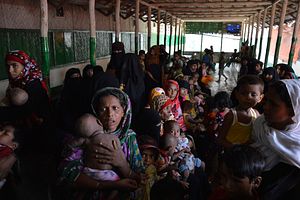Does Myanmar’s systematic persecution of its ethnic Rohingya population legally constitute genocide? And, if so, who should be held accountable?
New legal analysis by Yale Law School’s Lowenstein Clinic in conjunction with rights group Fortify Rights presents strong evidence to suggest that genocide is being committed against the Muslim minority group by Myanmar state actors, including the army, police and a recently disbanded border security force known as Nasaka.
The research, launched on Thursday at a press event in Bangkok, applies the 1948 Genocide Convention’s checklist of criminal elements to the Rohingya’s situation in Myanmar’s Rakhine State. The findings confirm that the Rohingya qualify as a protected group, that they have suffered acts defined under the convention as genocide, and that the state-sponsored acts have been committed with the intent to destroy the Rohingya as a distinct ethnic group, in whole or in part.
While acknowledging the Rohingya suffered discrimination and abuses under previous military rule, the Yale analysis focuses on abuses committed from 2012 to present under President Thein Sein’s quasi-civilian administration. These include documented cases of arbitrary detention, forced labor, sexual violence, restrictions on free movement and population control policies the report’s researchers likened to “biological genocide.” The study follows a 2013 Human Rights Watch report that characterized the persecution as “ethnic cleansing”, a non-legal term that lacks the criminal ramifications of genocide accusations.
The Yale research also argues that the dire condition of 140,000 internally displaced Rohingyas now being held in over 60 internment camps with limited access to food, clean water, sanitation, medical care and education represents genocidal intent. The ongoing persecution and poor conditions in IDP camps has caused as many as 160,000 Rohingya to flee Myanmar since 2012, according to Matthew Smith, Fortify Rights’ executive director. Thousands have fled by boat, often at the mercy of ruthless human trafficking gangs that have maintained death camps in Malaysia and Thailand. Despite these revelations, analysts expect a new exodus by sea when this year’s monsoon rains lift.
The analysis, however, falls short of asserting that genocide has unequivocally occurred, but could provide the legal foundation for building future legal cases against individual state actors, including potential indictments at the International Criminal Court in The Hague. Fortify Rights advocates for the United Nations to follow-up the Yale findings with an independent Commission of Inquiry tasked to investigate reports of violence, identify perpetrators, determine authoritatively if the acts constitute genocide, and recommend means for holding individuals accountable under both international human rights and criminal law.
If the Yale Lowenstein Clinic and Fortify Rights’ findings have legal merit, then Thein Sein would be a prime candidate for prosecution – although the report does not arrive at that explicit conclusion. While Thein Sein’s authority over the army is questionable under the current political configuration, his command control over the Nasaka is not in doubt. In July 2013, Thein Sein disbanded the joint agency under presidential order, just months after the United Nations identified the unit as responsible for committing various atrocities against the Rohingya, including extrajudicial killings, arbitrary arrest and torture.
Local press reports quoted Minister of Information and Presidential Spokesman Ye Htut denying the report’s findings, saying that the government “rejects the accusation completely.” He said that both ethnic Rohingyas and Rakhines have suffered and that the government is handling cases “equally” and “fairly” under local law. Ye Htut said the report’s release was intentionally timed to complicate the situation in western Rakhine State ahead of general elections scheduled for November 8. Nearly one million Rohingyas were arbitrarily stripped of their voting rights earlier this year, while over 100 Rohingya candidates have been barred from running in the polls by the military-appointed election commission.
The Yale report’s findings and analysis will make for uncomfortable reading among E.U. and U.S. officials. Both have richly rewarded Thein Sein’s political and economic reforms by lifting or suspending the previous sanctions they each imposed on Myanmar’s previous ruling junta’s poor rights record. The Obama administration in particular has touted its strong engagement with Thein Sein’s quasi-civilian regime, driven largely by the geostrategic imperative of counter-balancing China’s rise in the region, as one of its top foreign policy successes.
Before the diplomatic warming trend, Obama had called in 2010 for the establishment of a U.N. Commission of Inquiry into war crimes allegations against Myanmar’s top leaders for their roles in abusive counter-insurgency operations. The U.S.-led motion, later blocked by China, was launched in punitive response to indications the November 2010 elections would be rigged in favor of military candidates. With Western hopes now pinned on a democratic transition at the ballot box and even stronger ties with a new elected government, any calls for a U.N. genocide inquiry will likely be met, at least for now, by a steely silence in Brussels and Washington.













